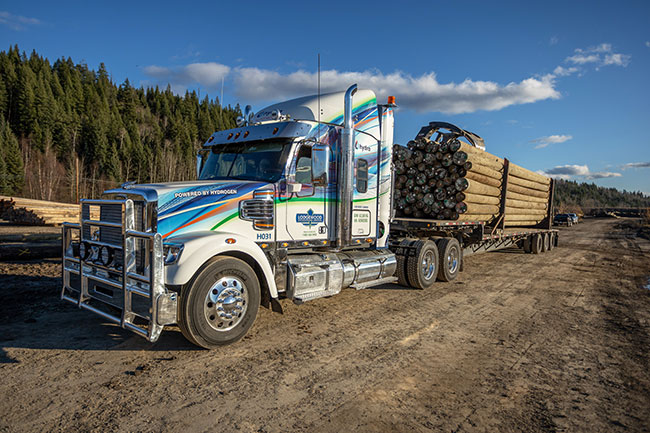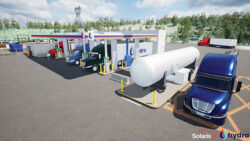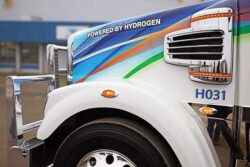
Features
Transportation
H fleet: Hydrogen-powered trucks’ green transition journey
Hydrogen production is just half the forestry story
August 29, 2023 By Laura Guzman
 A Hydra-converted Class 8 truck running on both hydrogen and diesel while transporting logs in B.C.
Photo courtesy Hydra.
A Hydra-converted Class 8 truck running on both hydrogen and diesel while transporting logs in B.C.
Photo courtesy Hydra. Although hydrogen was discovered hundreds of years ago, only recently has it experienced unprecedented political and business momentum around the world, thanks to its potential to curb carbon emissions and leverage existing infrastructure and resources.
For example, the Canadian government laid out its hydrogen strategy back in 2020 highlighting its commitment to becoming an international leader in producing and using clean hydrogen to reduce greenhouse gas (GHG) emissions and displace the country’s reliance on carbon-intensive fossil fuel energy.
However, even the most abundant, readily available, and emissions-friendly chemical substance in the universe has its challenges. Most notably, it’s been plagued by high production costs, potentially “dirty” production processes, and lack of infrastructure. But this has not dissuaded both the public and private sectors from continuing their financial and regulatory support mainly driven by hydrogen’s promise to help reduce carbon emissions on the world’s path to net-zero.
This is why organisations like the Forest Products Association of Canada are committed to moving Canada towards a greener tomorrow, outright supporting the government’s goal of net-zero emissions by 2050. Similarly, provincial groups like the B.C. Council of Forest Industries have committed to growing a more sustainable forest sector through a continuous focus on innovation and responding to community needs. But how is the industry utilising hydrogen today?
To date, most hydrogen-related talk within forestry has focused on turning forestry waste into green hydrogen. Additionally, there have been reports of hydrogen-fuelled machines like Volvo’s world-first hydrogen-articulated hauler and the H2 dual power hydrogen-powered tractor from New Holland and Blue Fuel Solutions. But this is just half of the forestry story when it comes to hydrogen. Where the full opportunity exists is when it comes to both producing and using clean hydrogen to replace reliance on fossil fuels and to reduce GHG emissions – at all points in the supply chain – providing a cleaner approach end-to-end including where it’s needed most: the transport of goods.
Case in point: in March of this year, B.C.-based hydrogen trucking pioneer Hydra Energy signed MOUs with eight commercial fleets in the Prince George region, including many forestry-related transport companies, to convert their existing heavy-duty Class 8 trucks to run on Hydra’s proprietary hydrogen-diesel, co-combustion technology, immediately reducing emissions up to 40 per cent per truck at no cost to fleet owners.

A rendering of the world’s largest hydrogen refuelling station Hydra is currently building in Prince George, B.C. to service Hydra-converted trucks in the region.
Not only have these fleet owners realised the most economical way to run greener and comply with the sustainability-related requirements of their contracting forestry clients, but they’ve also managed to optimise their truck performance and fuel efficiency in the process.
Hydrogen is ideal for heavy-duty trucking applications since it meaningfully reduces GHG emissions, provides the high torque and power needed for traction and heavy payloads, works in cold temperatures, refuels as quickly as diesel, and doesn’t add weight of heavy batteries that reduce payload and revenue.
With a practical, hydrogen transition solution like Hydra’s, the overall economics make sense as noted by Annie Horning, CEO of Excel Transportation that services the B.C. forest industry.
“Once we heard about the progress Hydra has been making on their hydrogen refuelling station right in our own backyard, the fact their hydrogen wouldn’t cost us more than diesel, and that it would cost nothing to retrofit our trucks to run cleaner and more efficiently, we couldn’t pass on the opportunity. Hydra allows us to make a positive difference sooner than later while eliminating our range anxiety concerns that could impact our service reliability,” Horning said.
But how is Hydra able to make hydrogen transportation possible within Canadian forestry right now when hydrogen has continued to be touted as the “fuel of the future”, not the fuel of today? The first internal combustion engine powered by hydrogen occurred as far back as 1804, yet progress since then has been limited.
The secret lies in Hydra’s innovative Hydrogen-as-a-Service (HaaS) business model, which makes the economics work now. That means the company’s zero-cost, proprietary dual-fuel conversion kit for heavy-duty trucks is just one piece of the larger puzzle.

Hydra signed MOUs with commercial fleets in B.C. to convert their existing heavy-duty Class 8 trucks to run on Hydra’s proprietary hydrogen-diesel, co-combustion technology.
Hydra’s HaaS approach uniquely connects low-carbon hydrogen supply and demand in a way that helps companies profitably bring hydrogen to market at scale and commercial fleet operators secure reliable, long-term, local clean fuel contracts at diesel-equivalent prices with no-up front investment.
For example, if you’re a forestry company that is producing hydrogen from operational waste, that same fuel could potentially be used to support Hydra-converted trucks of your own or fleets you contract to move your wood products. That or converted trucks in Northern B.C. could leverage the world’s largest hydrogen refuelling station Hydra is currently building in Prince George to be operational next year.
Hydra continues to sign commercial fleets serving the B.C. forestry industry in its quest to help reduce the province’s excessive transportation-related emissions. The company has also expanded its HaaS offering into Alberta and is working with potential licensees around the world looking to monetize their own hydrogen at scale in the most profitable way possible, proving hydrogen can be utilised along all aspects of the supply chain.
As Hydra CEO Jessica Verhagen puts it, “Hydra’s HaaS business model and proven performance on real-world truck routes over past years demonstrate the possibilities for hydrogen across the value chain in forestry right now. Yes, as a country we have the potential to leverage our incredible natural resources to produce the hydrogen the world needs and we also have the innovation to leverage that same hydrogen right in our own backyard.
“Our practical, transition solution is one that forestry company fleets or transport service providers want to adopt today, we think hydrogen has already proven it has a role to play in the future of Canada’s forest sector.”
Laura Guzman is Hydra’s vice-president, partnerships. She has opened up critical opportunities for Hydra to advance new partnerships with government, industry, NGOs and First Nations. She is responsible for advocating for improved hydrogen policy across governments.
Print this page